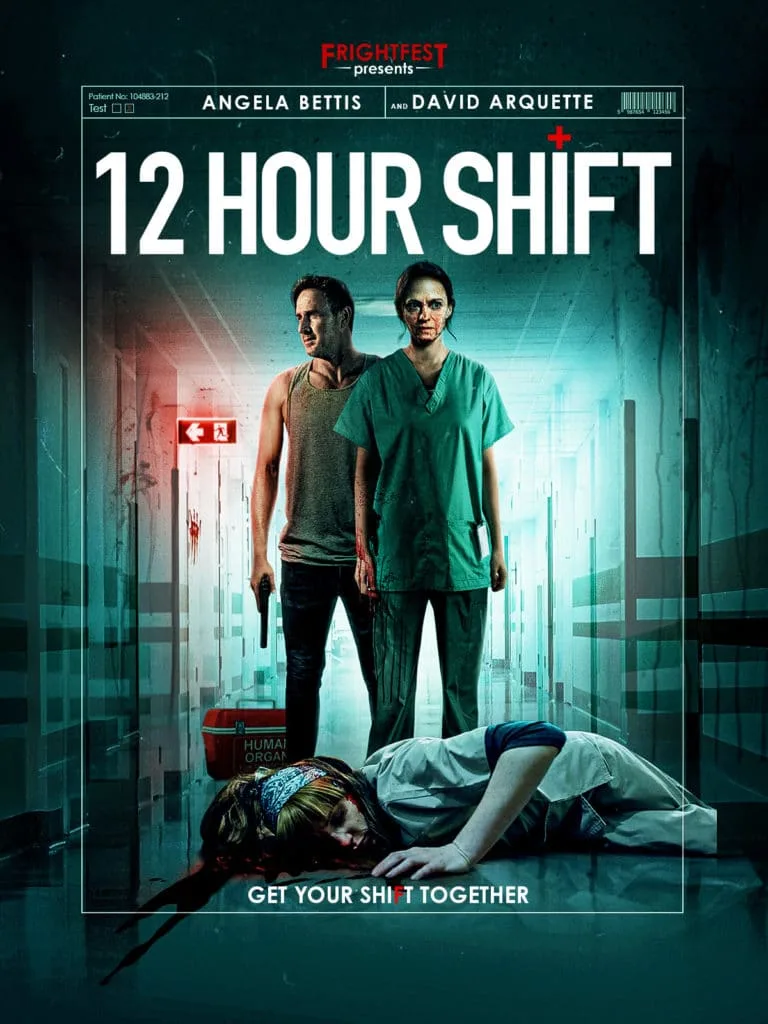
Arkansas, 1999. Mandy (Angela Bettis) is the world’s most disinterested nurse at the local hospital, and we meet her just ahead of a double shift. This isn’t the only reason she’s a little curt, though. To give her credit, her apparent disinclination for nursing is multifaceted: she’s a drug addict who enjoys hoovering up any spare medication she can get her hands on, but more pointedly, she’s also part of a hospital-wide and obviously very illegal trade in human organs. These she retrieves from patients who are on the verge of death anyway – albeit helping them along – puts them in a cooler, and sells them on to her cousin Regina (Chloe Farnworth in a film-carrying role).
Of course, the plot is eked out fairly thinly here; carting human organs around for the purposes of selling them to a local crime syndicate is one thing, but then the treatment of the organs themselves, well – I’m no medic, but I am fairly sure they’d be of no use to anyone having been slung into a carrier bag for what seems like an awfully long time. Let’s just accept that the whole premise and its delivery is cartoonish rather than anything else. Things begin to go badly wrong, when Regina manages to head off from the hospital without the kidney she was sent for. She only realises this when she gets back to the gang who is expecting her (with a blink-and-miss-it cameo by Mick Foley here). Another kidney has to be procured, pronto: Regina returns to the hospital, and when Mandy gives her short shrift she uses her ingenuity (!) to try to get one herself.
This all starts a chain of events in a ‘comedy of errors’ style, with one violent, ill-thought-out and potentially exposing act following hard upon the last. Casual slaughter, corpse mutilation, the presence of grim stereotypes such as the cop-hating serial murderer fresh from jail, a flirtatious and somewhat hapless cop, vengeful gangsters and expendable patients all figure here in a film which ticks along at a fair pace, becoming funnier as it goes along and perhaps as viewers settle into a mode, watching what is next to befall the sullen, far-from-impressed Mandy and wondering how it’ll all pan out. 12 Hour Shift was a big hit on the film festival circuit in 2020, and it’s clear to see why: it has that nifty balance of the ridiculous and the extreme which definitely serves a group watch.

There is a little more to it than that. The gritty reality of nursing is addressed in 12 Hour Shift, albeit in darkly comic fashion: suicide attempts, ODs, people sick to death with long-term illness. The film is also very disruptive of the typical idea of nurses as angels; these women are stone cold, deeply flawed, but still to some extent sympathetic, which is a credit to director and writer Brea Grant’s characterisation of them. The impression is of people underpaid and worn out by the job, whilst the presence of a certain ODer throws Mandy into even more of a spin when it’s revealed how she knows him, and what this all means. Still, life lessons are offered up as some context, but the emphasis remains on the macabre farce itself. Integral to that farce is Regina, and her importance increases and increases throughout the film, as she moves from a common-or-garden dumb blonde to a key driver of the chaos which unfolds and, finally, even looks as though she’s learned something (maybe) as she navigates her way to the end of the narrative.
So why is the film set at the end of the nineties? This is the one real quibble I would have with the film, as it felt a little pointless to me (though I would still prefer this approach to the much-imitated ‘timeless’ timeframe which deliberately tries to seem as though it belongs to no specific time at all). Aside from some analogue TVs and some mention of Beanie Babies, the setting has little bearing on the plot; sure, there’s a mention that the police had some officers at a Y2K training event, but it could have been anything keeping them away. If it’s just slightly retro for the sake of it, then it seems a fair amount of trouble to go to for little reward; that said, the lack of mobile phones here certainly allows the film’s misunderstandings to flourish, and perhaps does more for the plot than the singular Y2K reference.
All in all, though, for an as-yet inexperienced director like Brea Grant, 12 Hour Shift is a very entertaining, often creative horror film which makes you realise how grim your sense of humour can get. Some clever casting decisions really help here, and the interplay between Bettis and Farnworth is a pleasure to watch, alongside a decent supporting cast too (including David Arquette!) This is a grotty, grisly horror comedy with much to recommend it.
FrightFest Presents and Signature Entertainment present 12 Hour Shift on Digital Platforms 25th January 2021.
